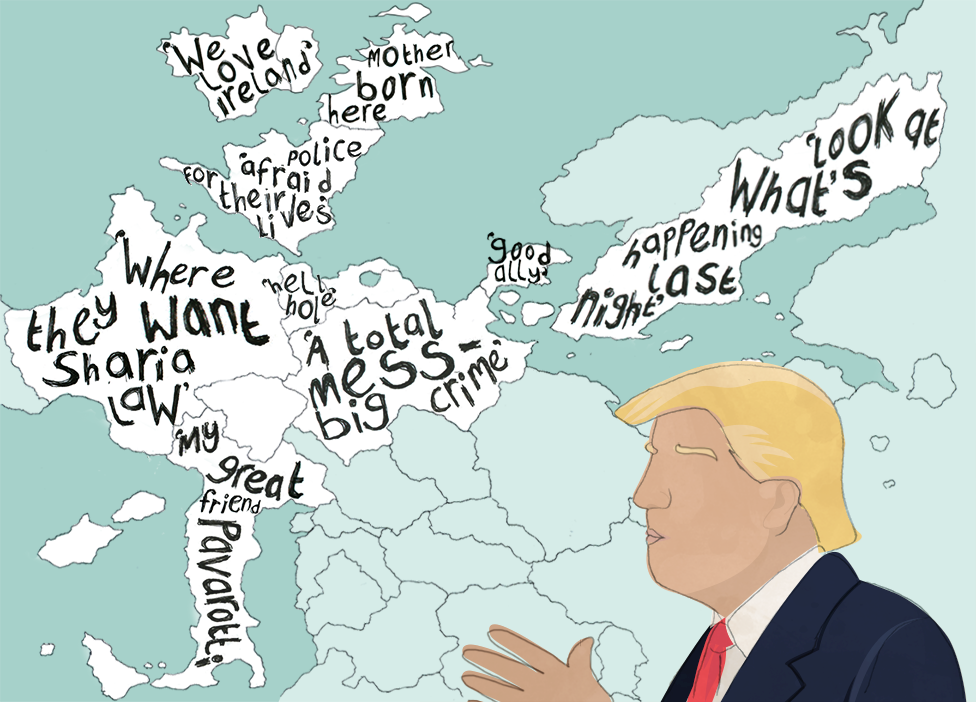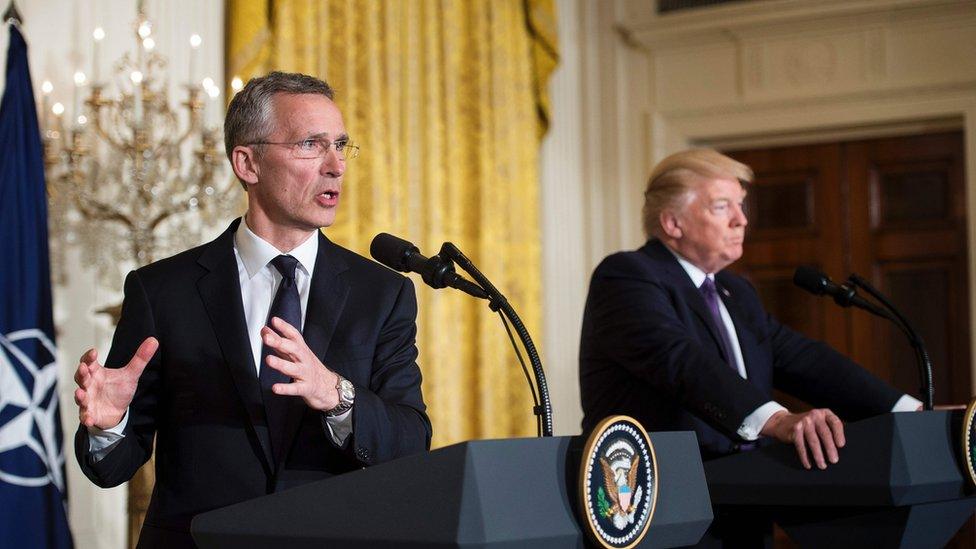Upon arrival, Trump sees Europe in stark terms
- Published

President Trump sees Europe as a place filled with cheaters and bedlam - and as a place populated by lovely people. Soon he'll be meeting with European leaders and will try to explain his contrasting views. What could go wrong?
On Wednesday, Trump will spend his first full day in Europe as the US president. He's said so many different things about the place - sometimes he says he loves the continent and other times calls it a hellhole - that it's hard to know how things will go.
One thing is certain: his schedule is packed. He'll visit Rome, the Vatican and Brussels on Wednesday, speaking on that day with Pope Francis and later in the evening with King Philippe of the Belgians. On Thursday he'll spend the day in Brussels, having lunch with President Emmanuel Macron of France and talking with European Union officials, then he heads to Sicily for a Group of Seven meeting.
During his whirlwind tour of the continent, he'll speak with the Europeans about Nato and defence spending of various countries (he thinks they should make a bigger financial commitment to the alliance).
Trump on first foreign trip as US President
He'll also talk about US foreign policy and his vision for the nation's role on the global stage. Over the course of the trip he's likely to be preoccupied, however, with the recent controversies in Washington, including the sacking of the FBI director James Comey and his own relationship with Russian officials.
His meetings in Europe could go well, or they could go very badly. So much depends upon his mood, say those who are close to him, and on the temperament of those who meet with him.
Trump is a "salesman", said Ruth Ben-Ghiat, a professor of Italian studies and history at NYU, and for that reason he's likely to adjust his remarks to make the people around him happy - at least for the moment.
Why has Trump been so harsh on Iran?
Saudi deals kick off Trump foreign tour
How will homebody Trump cope abroad?
Trump-Russia scandal: How did we get here?
His aides believe that one of the president's strengths is his ability to deal with people in the moment and adapt on the fly. They cast him as a dealmaker par excellence, closing a sale when the time is right (or abruptly upping the ante), and in this way justify the way that he's expressed so many, conflicting views of the continent.
Michael S Smith, a terrorism analyst who has advised the US government, said: "The biggest challenge he's going to face is managing relationships after sending so many mixed signals."
He's offered up odd, disjointed praise: "Belgium is a beautiful city," he once said (he's also called Brussels "a hellhole, external"). He seems to be fond of Scotland, the place where his mother was born. Still he's not exactly embraced local customs.
Last year he visited a Scottish town with pubs where, as one of his travelling companions told me, "They served rabbit." So they drove to a town about 25 miles away with a McDonald's. It was another sign that he doesn't embrace European traditions and - sometimes at least - views them with distaste.
On a more serious level he's said Nato is "obsolete" and then seemed to change his mind. He once described Germany as a "total mess, external", tweeting that the country "owes vast sums of money to NATO & the United States must be paid more for the powerful, and very expensive, defense it provides to Germany!"

A joint press conference with Nato Secretary General Jens Stolenberg in April
In his reckoning, the Europeans exploit trade deals. He's said the trade agreements are "very unfair to the United States." He's said he doesn't think the EU "matters very much for the United States", and he's described it as "basically a vehicle for Germany".
He was elected in part because of his outspoken manner and his tough, uncompromising positions: he made it clear that America wasn't going to get pushed around - by the Europeans or anybody else - and that he'd focus on American interests.
It's harder to act like a pit bull about American interests when you're talking to people who don't see them as their priority. Since taking office, he's tried to make amends with the Germans and the other Europeans who've visited the White House. More recently he's been advised to soften his tone while he's in Belgium and Italy, and to downplay his views about trade.
Will Trump envy Pope's Vatican wall?
Still he's not going to soft-pedal all of his views. George Mason University's Francis Buckley, who worked on a foreign-policy speech for Trump during the campaign, said Trump has made it clear Europeans must contribute more to Nato and believes, Buckley explained, "that would have to be corrected".
Critics of the administration believe that the president has a dark view of Europe and has aligned himself with nationalist forces - and point to his generous assessment of authoritarian leaders in Russia and Turkey. In this way the president's views are, said Ben-Ghiat, "destabilising".
Smith adds: "The president has been posturing his intention to align the US with Russia in a manner that most people would consider stunning."
Smith said he hoped the president's travels through Europe would help to clarify his positions towards Nato, the EU and other institutions and dispel concerns about his intentions.
Up to this point, Smith said: "It's all been a fog of known unknowns."